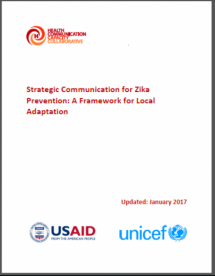Strategic Communication Framework for Zika
This framework provides step-by-step guidance and illustrative content for creating a strategic communication strategy to communicate accurately and effectively about Zika risk and prevention in an easy-to-understand and comprehensive format.
It builds on the messaging developed in the United Nations International Children’s Emergency Fund (UNICEF) Risk Communication and Community Engagement for Zika Virus Prevention and Control guidance, and is intended to guide country-level communication strategies. This framework follows a systematic process and provides content that is readily adaptable by any communication program.
The strategy is attached in one PDF combining English and Portuguese versions.
Source: Johns Hopkins University Center for Communication Programs
Date of Publication: March 25, 2019
SIMILIAR RESOURCES
Tools
Examples
- Technical Specifications Content Guide for Behaviors with High Potential to Prevent Zika
- Social Behavior Change Programming for Public Health Emergencies: Lessons Learned from the USAID Zika Response in Latin America and the Caribbean
- Zika Communication Network
- The Importance of Social and Behavioral Change Response in the Zika Outbreak: Lessons Learned from Ebola
- Prevention of Sexual Transmission of Zika Virus
- Zika Virus Global Emergency Response Plan
- Strengthening the USAID Zika Response: Experiences from the Zika Social and Behavior Change Working Group
- Integrated Management Strategy for Dengue Prevention and Control
- Risk Communication and Community Engagement for Zika Virus Prevention and Control
- Zika Infographics
- Evidence-Based Prioritization Process to Identify Behaviors for Zika Prevention
- Insights Report: Using human-centered Design to Identify Improved Behavioral and Structural Solutions for Zika Prevention
- Perceptions About Zika-related Prevention Behaviors in the Dominican Republic: Findings and Implications from a Qualitative Study
- Feasibility and Effectiveness of Behaviors to Prevent Zika in El Salvador: Results of a Qualitative Study
- Facilitator's Guide for Training on Interpersonal Communication Skills

